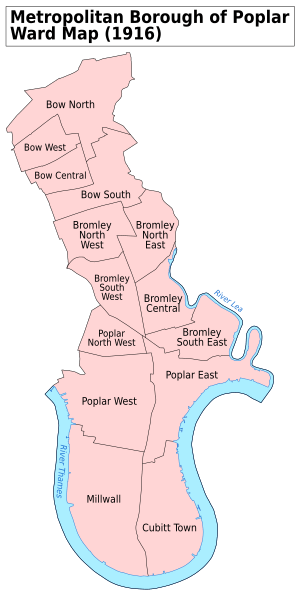Bow and Bromley (UK Parliament constituency) facts for kids
Quick facts for kids {{{Name}}}[[{{{Type}}} constituency]] |
|
|---|---|
| [[Image:{{{Map1}}}Constituency.svg|120px|]] [[Image:England{{{Map2}}}.svg|120px|]] |
|
| {{{Name}}} shown within [[{{{Entity}}}]], and {{{Entity}}} shown within England | |
| Created: | {{{Year}}} |
| MP: | {{{MP}}} |
| Party: | {{{Party}}} |
| Type: | House of Commons |
| County: | [[{{{County}}}]] |
| EP constituency: | [[{{{EP}}} (European Parliament constituency)|{{{EP}}}]] |
Bow and Bromley was a special area in London that elected one person to the Parliament of the United Kingdom. This area, called a constituency, was created in 1885. It was located in the Metropolitan Borough of Poplar. People in Bow and Bromley voted for their chosen Member of Parliament (MP) until the area was changed in 1950.
Contents
Discovering Bow and Bromley's Political Past
Before 1885, the Bow and Bromley area was part of a larger constituency called Tower Hamlets. This bigger area used to elect two MPs. But in 1885, the rules changed, and Tower Hamlets was split into smaller parts, creating Bow and Bromley.
A Look at the Early Elections
In its early years, before 1918, the Bow and Bromley seat was often won by different political parties. This means it was a "marginal" seat. The party that held the seat changed many times. For example, it switched hands in 1886, 1892, 1895, 1906, and several times in 1910 and 1912.
George Lansbury: A Key Figure
A very important MP for Bow and Bromley was George Lansbury. He was first elected in December 1910 as a Labour candidate. Lansbury was known for his strong beliefs. He was on the left-wing of the Labour Party. He was also a pacifist, meaning he believed in peaceful ways to solve problems, not war. He was also a big supporter of votes for women.
In November 1912, Lansbury did something unusual. He resigned from his seat. He wanted to see if people in Bow and Bromley really supported women getting the right to vote. However, he lost the special election that followed. He didn't become an MP again until 1922.
Lansbury later became a very important leader in the Labour Party. After the 1931 election, he was one of the few Labour leaders who kept his seat in Parliament. He became the Acting Leader of the Labour Party. Then, in 1932, he was officially elected as the party leader. He led the Labour Party until 1935.
Where Was Bow and Bromley Located?
In 1885, the Bow and Bromley area was part of a larger region called "The Metropolis." This was in the eastern part of Middlesex county. The neighborhoods of Bow and Bromley were joined together. They formed a part of the Tower Hamlets parliamentary area. This area was in the East End of London. It's important to know that the Bromley in this seat is different from Bromley, South London. That other Bromley later had its own constituency created in 1918.
Changes Over Time
In 1889, the Tower division of Middlesex became part of the new County of London. Then, in 1900, the local government in London was reorganized. Bow and Bromley became part of the Metropolitan Borough of Poplar.
When parliamentary seats were redrawn in 1918, the Bow and Bromley constituency became a division of Poplar. It included specific local areas called wards. These were Bow Central, Bow North, Bow South, Bow West, Bromley North East, Bromley North West, and Bromley South West.
Who Represented Bow and Bromley?
Here is a list of the Members of Parliament (MPs) who represented Bow and Bromley:
- The constituency was created in 1885.
| Year | Member | Party | |
|---|---|---|---|
| 1885 | William Robson | Liberal | |
| 1886 | Sir John Colomb | Conservative | |
| 1892 | John Macdonald | Liberal | |
| 1895 | Lionel Holland | Conservative | |
| 1899 | Walter Guthrie | Conservative | |
| 1906 | Stopford Brooke | Liberal | |
| 1910 Jan. | Alfred du Cros | Conservative | |
| 1910 Dec. | George Lansbury | Labour | |
| 1912 | Reginald Blair | Unionist | |
| 1922 | George Lansbury | Labour | |
| 1940 | Charles Key | Labour | |
- The constituency was abolished in 1950.
Images for kids
 | Stephanie Wilson |
 | Charles Bolden |
 | Ronald McNair |
 | Frederick D. Gregory |








